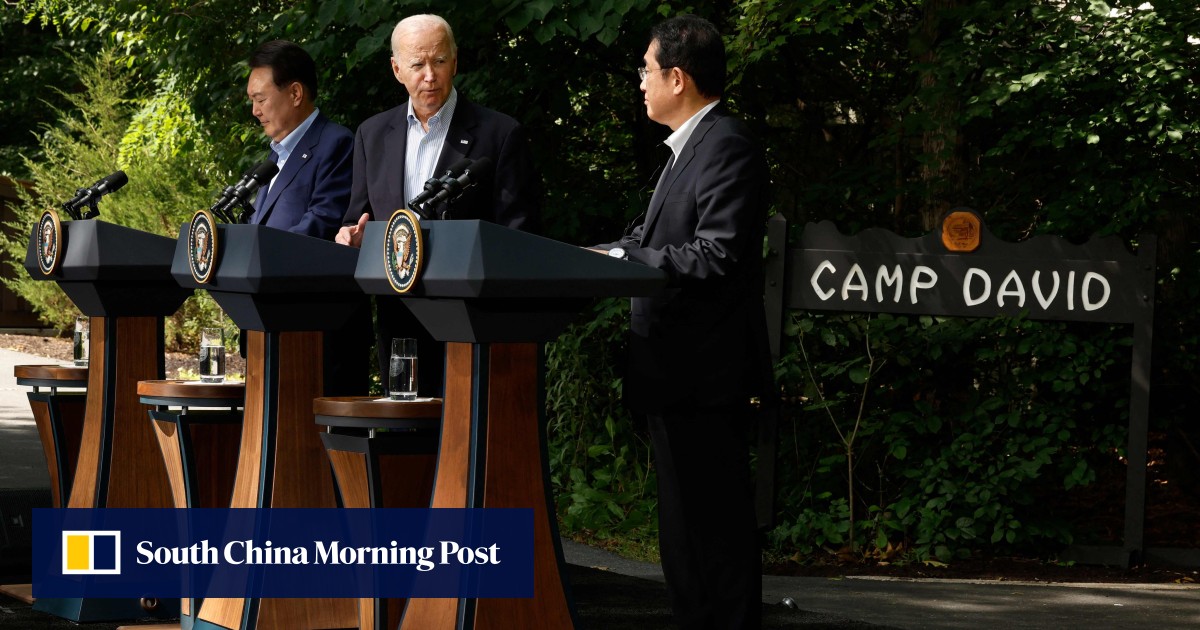Viet
ELITE MEMBER

- Joined
- Jun 18, 2012
- Messages
- 29,950
- Reaction score
- 0
- Country
- Location
- As Beijing seeks closer economic ties with its neighbours in Southeast Asia, restraint in the South China Sea is needed, experts say
- The Camp David summit, as well as an upcoming meeting between the US and Vietnam, will add to China’s geopolitical woes
Beijing may need to rethink its strategies in the South China Sea to avoid further isolation, observers said, after Washington signed deals with Japan and South Korea on expanding security cooperation.
But as it seeks to forge closer economic ties and make peace with its Southeast Asian neighbours, there may be few options available to Beijing over the South China Sea since major compromises are deemed unlikely, they added.
The assessment was made in response to the recent trilateral summit at Camp David between US President Joe Biden, Japanese Prime Minister Fumio Kishida and South Korean President Yoon Suk-yeol.
The three leaders formalised their joint commitment at the meeting to consult each other on security threats. As a result, China now faces some of its worst geopolitical dilemmas of recent years.
The summit was considered a watershed momentfor Biden's Indo-Pacific strategy of using Washington-led alliances to counter China's growing influence. Some Chinese media described the Camp David meetting as a "half-step away" from forming a Nato in Asia.
In a move that could further rattle Beijing, it has also been reported that Biden will visit Hanoi next month to bolster ties with Vietnam.
Politico cited three sources as saying the two former wartime foes are expected to upgrade their relationship to a strategic partnership during the visit, which is likely to take place in mid-September.
The partnership would see priority "given to enhancing bilateral trade and investment, including e-commerce and the digital economy, and building robust supply chains through 'friend-shoring'", according to Carl Thayer, an emeritus professor at the University of New South Wales in Australia who specialises in Vietnamese affairs.
Thayer said closer ties between Washington and Hanoi could raise the alarm in Beijing, which sees a stable neighbourhood as a top diplomatic priority, particularly amid its geopolitical competition with the US.
"Beijing will continue to pressure Vietnam not to take steps that will harm China's interests, but China is constrained in its reaction lest it forces Vietnam closer to the US," said Thayer.
"Privately, China's leaders will have to reassess whether their step up in pressure against Vietnam and the Philippines in the South China Sea this year was counterproductive," he said.
"This reassessment is now all the more urgent following the US-Japan-South Korea trilateral summit and the impending elevation in US-Vietnam relations."
Zhang Mingliang, a Southeast Asian affairs specialist at Jinan University in Guangzhou, said it was likely that Southeast Asian countries such as Vietnam, which has been a vocal critic of Beijing's claims in the South China Sea, would find a "mini-Nato" in Asia palatable.
"However, in order to avoid irritating its neighbour in the north, Vietnam will be cautious in its rhetoric but spare no efforts to support 'Asia's Nato' through practical actions," Zhang said.
In a joint statement after the Camp David meeting, the three countries reaffirmed their support for the central role played by the Association of Southeast Asian Nations, but also went further in criticising China's "dangerous and aggressive behaviour supporting unlawful maritime claims" in the South China Sea.
The criticism was apparently referring to a confrontation earlier this when after the Chinese coastguard fired water cannon to block a Philippineship from resupplying troops stationed on the disputed Second Thomas Shoal in the Spratly Islands.

Few options left for Beijing in South China Sea after Camp David summit
Plan between the US and Vietnam to bolster ties will add to China’s geopolitical woes, experts say
